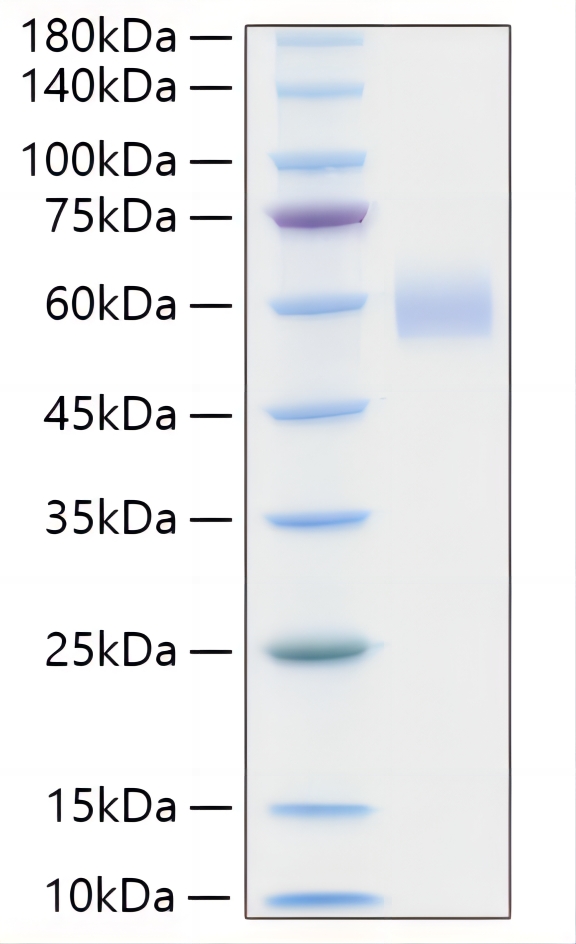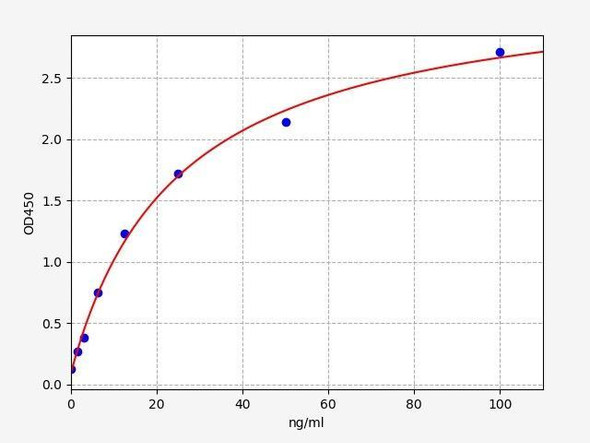Description
Recombinant Human Lp-PLA2/PLA2G7 Protein
The Recombinant Human Lp-PLA2/PLA2G7 Protein is a biologically active recombinant protein that plays a significant role in various cellular processes and signaling pathways in human biology. This protein is widely employed in immunological research, cell biology studies, protein-protein interaction analyses, and therapeutic development, providing researchers with a reliable tool for investigating Lp-PLA2/PLA2G7 function and its implications in health and disease.
This product (SKU: RPCB1842) is produced using HEK293 cells and features a C-His tag for convenient detection and purification. The protein exhibits a calculated molecular weight of 48.63 kDa with an observed molecular weight of 50-60 kDa under denaturing conditions, achieving ≥ 95 % as determined by SDS-PAGE., ensuring exceptional quality and consistency for research applications.
Key Features
| High Purity by Affinity Chromatography | |
| Mammalian & Bacterial Expression Systems | |
| High lot-to-lot consistency via strict QC |
| Product Name: | Recombinant Human Lp-PLA2/PLA2G7 Protein |
| SKU: | RPCB1842 |
| Size: | 10 μg , 20 μg , 50 μg |
| Reactivity: | Human |
| Synonyms: | PLA2G7, LDL-PLA2, LP-PLA2, PAFAD, PAFAH |
| Tag: | C-His |
| Expression Host: | HEK293 cells |
| Calculated MW: | 48.63 kDa |
| Observed MW: | 50-60 kDa |
| Gene ID: | 7941 |
| Protein Description: | High quality, high purity and low endotoxin recombinant Recombinant Human Lp-PLA2/PLA2G7 Protein (RPCB1842), tested reactivity in HEK293 cells and has been validated in SDS-PAGE.100% guaranteed. |
| Endotoxin: | < 1 EU/μg of the protein by LAL method. |
| Purity: | ≥ 95 % as determined by SDS-PAGE. |
| Formulation: | Lyophilized from a 0.22 μm filtered solution of 50mM NaAc, 150mM NaCl, 10% glycerol (pH 5.0) |
| Reconstitution: | Centrifuge the vial before opening. Reconstitute to a concentration of 0.1-0.5 mg/mL in sterile distilled water. Avoid vortex or vigorously pipetting the protein. For long term storage, it is recommended to add a carrier protein or stablizer (e.g. 0.1% BSA, 5% HSA, 10% FBS or 5% Trehalose), and aliquot the reconstituted protein solution to minimize free-thaw cycles. |
| Storage: | Store at -20℃.Store the lyophilized protein at -20℃ to -80 ℃ up to 1 year from the date of receipt. After reconstitution, the protein solution is stable at -20℃ for 3 months, at 2-8℃ for up to 1 week. |
Platelet-activating factor acetylhydrolase, also known as 1-alkyl-2-acetylglycerophosphocholine esterase, 2-acetyl-1-alkylglycero-phosphocholine esterase, Group-VIIA phospholipase A2, LDL-associated phospholipase A2, PAF 2-acylhydrolase, PLA2G7 and PAFAH, is a secreted protein that belongs to the AB hydrolase superfamily and Lipase family. PLA2G7 / PAFAH modulates the action of platelet-activating factor (PAF) by hydrolyzing the sn-2 ester bond to yield the biologically inactive lyso-PAF. It has specificity for substrates with a short residue at the sn-2 position. It is inactive against long-chain phospholipids. PLA2G7 / PAFAH is a potent pro- and anti-inflammatory molecule that has been implicated in multiple inflammatory disease processes, including cardiovascular disease. PLA2G7 also represents an important, potentially functional candidate in the pathophysiology of coronary artery disease (CAD). Defects in PLA2G7 are the cause of platelet-activating factor acetylhydrolase deficiency (PLA2G7 deficiency). It is a trait that is present in 27% of Japanese. It could have a significant physiologic effect in the presence of inflammatory bodily responses.







